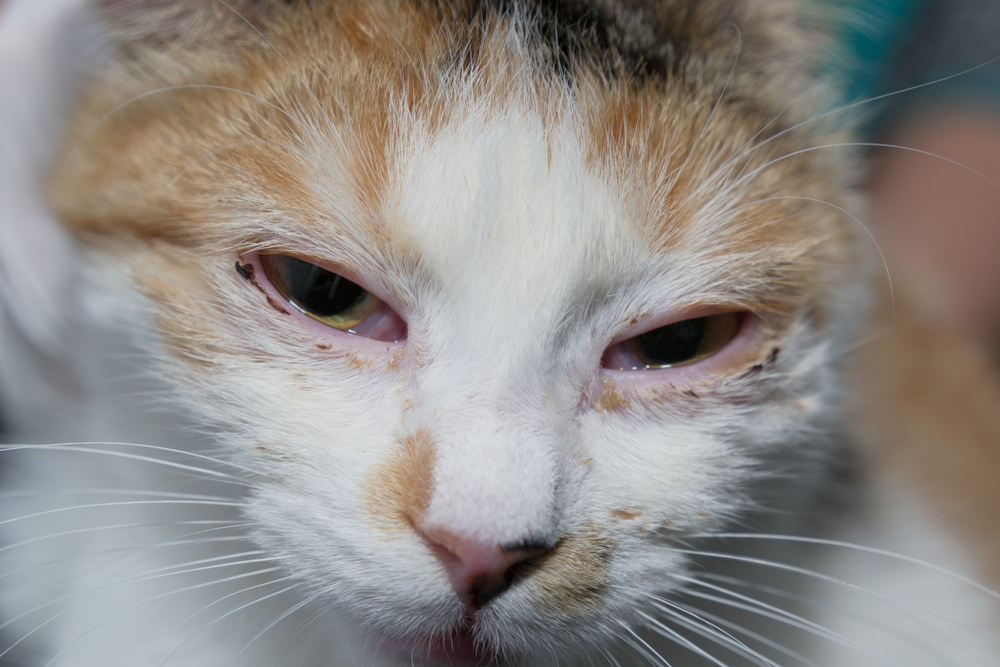Cat Herpes Causes, Symptoms, and Treatment
Cats are beloved companions in countless households, but like any pet, they can face health challenges. One of these challenges is cat herpes, a viral infection that can affect felines of all ages. In this comprehensive guide, we’ll delve into the world of cat herpes, shedding light on its causes, symptoms, and effective treatment options.
As a responsible cat owner, understanding cat herpes is crucial for providing the best care possible for your furry friend. With recent updates in feline health research, there’s more knowledge than ever to help you keep your cat healthy and happy.
What Is Cat Herpes?
Cat herpes, scientifically known as Feline Herpesvirus Type 1 (FHV-1), is a contagious viral infection that primarily affects cats. FHV-1 belongs to the herpesvirus family, and it’s one of the leading causes of upper respiratory infections in felines.

Understanding Feline Herpesvirus Type 1 (FHV-1)
FHV-1 is a highly contagious virus that spreads through direct contact with an infected cat’s bodily fluids, including saliva, nasal secretions, and eye discharge. Cats can contract the virus through grooming, shared litter boxes, or even casual contact, making it a common concern in multi-cat households and shelters.
How FHV-1 Affects Cats
Once a cat is infected with FHV-1, the virus can remain dormant in its system for years. Stress, illness, or other factors can trigger flare-ups, causing a range of symptoms that affect the eyes, nose, and respiratory system. These symptoms can be uncomfortable for your cat and may require prompt attention from a veterinarian.
Symptoms of Cat Herpes
Recognizing the symptoms of cat herpes is essential for early detection and treatment. Cats infected with FHV-1 may exhibit a variety of symptoms, often resembling a common cold or flu.
Common Symptoms of Cat Herpes
Sneezing and Nasal Discharge:
Cats with FHV-1 often have sneezing fits and may have clear or cloudy nasal discharge.
Eye Ulcers and Conjunctivitis:
Eye-related symptoms are common, including redness, squinting, and ulcers on the cornea.
Coughing and Respiratory Distress:
FHV-1 can cause coughing, wheezing, and labored breathing due to nasal congestion.
Diagnosing Cat Herpes
If you suspect your cat may have contracted FHV-1, it’s essential to seek professional veterinary care for a proper diagnosis. Veterinarians have several methods to diagnose cat herpes effectively.
How Veterinarians Diagnose FHV-1
Clinical Examination:
During a physical examination, the vet will assess your cat’s symptoms, including nasal discharge, eye ulcers, and respiratory issues. A clinical evaluation is often the first step in diagnosing cat herpes.
Laboratory Tests:
In some cases, additional tests may be necessary. These could include swabs of nasal or eye secretions for laboratory analysis. These tests help confirm the presence of the herpesvirus and rule out other potential causes of similar symptoms.
Medical History:
Providing your veterinarian with a detailed medical history, including your cat’s vaccination records and any previous health issues, can aid in the diagnosis.
Treatment and Management
While there is no cure for cat herpes, several treatment options and management strategies can help alleviate symptoms and improve your cat’s quality of life during flare-ups.
Available Treatment Options
Antiviral Medications:
Veterinarians may prescribe antiviral medications like famciclovir or lysine supplements to help manage the virus. These treatments can reduce the severity and duration of symptoms.
Supportive Care:
Keeping your cat comfortable and well-hydrated is crucial during a herpes flare-up. Ensure your cat has access to fresh water and provide a warm, stress-free environment.
NLP-Oriented Advice for Cat Care
Understanding your cat’s needs during a herpes outbreak is vital. Cats often require extra attention, love, and care when they’re not feeling their best. Make sure to:
Monitor Symptoms:
Keep a close eye on your cat’s symptoms and contact your veterinarian if they worsen or persist.
Minimize Stress:
Cats with herpes are more susceptible to stress. Create a calm and predictable environment for your pet.
Regular Vet Check-ups:
Schedule regular check-ups with your veterinarian to track your cat’s overall health and address any concerns promptly.
Preventing Cat Herpes
Preventing the spread of cat herpes is crucial, especially in multi-cat households and shelters. Here are some practical tips to minimize the risk of transmission:
Tips for Preventing Cat Herpes Transmission
Isolation of Infected Cats:
If you have multiple cats and one is diagnosed with FHV-1, consider isolating the infected cat to prevent transmission to others.
Hygiene Practices:
Regularly clean and disinfect litter boxes, food bowls, and bedding. Ensure good hygiene practices to minimize the risk of virus transmission through shared items.
Vaccination Options:
Consult your veterinarian about vaccination options. While there is no herpes-specific vaccine, some vaccinations can help boost your cat’s overall immunity, reducing the severity of flare-ups.
Living with a Cat with Herpes
Living with a cat that has herpes can be manageable with the right care and understanding. Here are some practical tips for a harmonious life with your feline friend:
NLP-Focused Guidance on Cat Care During Flare-Ups
Regular Veterinary Check-ups:
Schedule regular check-ups with your veterinarian to monitor your cat’s overall health and discuss any concerns.
Stress Reduction:
Cats with herpes are sensitive to stress. Create a stress-free environment by maintaining a consistent routine and offering plenty of affection.
Cat Herpes and Other Health Issues
While cat herpes is a common viral infection, it can sometimes lead to complications or co-infections. Understanding the potential health issues associated with FHV-1 is essential for comprehensive cat care. In the next section, we’ll explore these complications and how to manage multiple health concerns in cats effectively.
Frequently Asked Questions (FAQs) About Cat Herpes
1. Q: Can cat herpes be cured?
Cat herpes cannot be completely cured, but symptoms can be managed with medication and supportive care.
2. Q: Is cat herpes contagious to humans?
No, cat herpes is not zoonotic, meaning it cannot be transmitted from cats to humans.
3. Q: How can I tell if my cat has a herpes flare-up?
Watch for common symptoms like sneezing, nasal discharge, and eye issues. Cats may also become lethargic during flare-ups.
4. Q: Should I keep my cat isolated if it has herpes?
Isolation is advisable during flare-ups to prevent transmission to other cats. Consult your vet for guidance on managing multiple cats.
5. Q: Can I vaccinate my cat against cat herpes?
There’s no specific vaccine for cat herpes, but some vaccinations can help boost your cat’s overall immunity, reducing the severity of flare-ups.
6. Q: How is cat herpes diagnosed by veterinarians?
Veterinarians diagnose cat herpes through clinical examination, medical history, and sometimes laboratory tests like swabs of nasal or eye secretions.
7. Q: Are there any natural remedies for cat herpes?
Some cat owners use supplements like L-lysine, but it’s essential to consult your vet before using any natural remedies to ensure they are safe and effective for your cat.
8. Q: Can stress trigger cat herpes flare-ups?
Yes, stress is a common trigger for herpes flare-ups in cats. Creating a calm and predictable environment can help reduce stress.
9. Q: What’s the best way to care for a cat with herpes during a flare-up?
Provide extra love, keep them well-hydrated, and maintain a stress-free environment. If symptoms worsen, consult your vet.
10. Q: Are there any long-term complications associated with cat herpes?
While cat herpes itself isn’t usually life-threatening, it can lead to eye and respiratory issues. Regular vet check-ups can help manage these complications effectively.
Conclusion:
In conclusion, cat herpes, or Feline Herpesvirus Type 1 (FHV-1), is a common viral infection in cats. While it cannot be cured, understanding its causes, symptoms, and treatment options is essential for cat owners. By recognizing the signs, seeking prompt veterinary care, and following management strategies, you can help your cat live a comfortable and happy life despite the presence of FHV-1.




